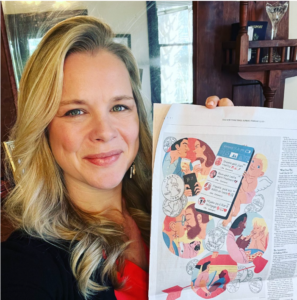I recently learned about the myriad reasons why contractors end up undercharging for their services for a piece published in Vox.
Why should you raise your fee? Let me count the ways.
- If you’re new to freelancing…
- If you’re not someone society taught to feel valuable…
- If you’ve been feeling depressed (who, me??? With the Haagen Daaz and remote control?)…
You might be undercharging. If you are a human being who’s trying to make a living as a freelance writer, chances are you’re undercharging.
If you think (or are wondering if) you fit this description, here’s how to know, and what to do about it.
How to stop undercharging
Create community
As a freelancer, you’re naturally isolated. So you’ve got to reach out. Connecting is the only way you’ll know if you’re undercharging, because why would clients tell you that you’re such a deal? Only other freelance writers will.
So many online communities exist for writers. You can:
- Join a group, like on Facebook or LinkedIn.
- Follow a hashtag like #writercommunity or #freelancewriters on Twitter.
- Follow a list of Fellow Freelancers
- Join the mob at Absolute Write Water Cooler, which has 68,000 members and threads on every genre imaginable.
- Pop into A Very Important Meeting to ask us anything during the chat time. We often get into discussions about writing assignments.
Do you write B2B web copy for Elvis impersonators? There’s a community for you.
When you find your tribe, just ask, “What would you charge for a lawyer who needs a Tinder profile written?” or whatever you’re writing. Others will be happy to hop in and help, because we’ve all been there.
The closer you are with other writers, the more intel they’re likely to be willing to give you. For example, if they worked for the same client, you might be able to find out exactly how much they were paid. I’ll often have friends who recommend me for jobs tell me how much the client is currently paying them, to make sure I get the same amount.
Find a mentor
Another great way to get these answers is to find a mentor. I’m not saying you have to hire someone necessarily. But identify some people who can give you the feedback you’ll trust.
You can find a mentor by:
- Taking a class or following someone who likes to help freelance writers on social media. I like Kat Boogaard and Bizzy Coy. I also have a list on Twitter called, For Freelancers with some people who might be great.
- Follow orgs for freelancers like the Freelancers Union.
- Hire a coach.
You need both the facts about how much you should be charging and the encouragement to charge what you’re worth.
Get the best intel you can
Basically, information is your power, and you can’t have power in your negotiation sessions without the information from your community and those who have been doing this a long time.
Investigative journalist Scott Carney created this sheet cataloging the freelancing rates of many of the major U.S. publications, as a place to start.
You can also gather information from your own experience with the client.
- How long have you been working for them without a raise?
- How many clicks or sales have they gotten as a result of your work?
- How does their pay relate to the pay from your other clients?
What to do about undercharging for your writing
Let’s say you’ve confirmed it: You’re undercharging. Now comes the hard part. You have to be willing to ask for more. Here are your options.
Tell your clients you’re raising your rates
This is the most baller move. Unlike in employment, where you have to ask for a raise, in freelance writing, you can just give yourself one. But here’s the thing: you have to be willing to let the client walk away. This is where having savings, low overhead, and a solid pipeline of potential customers all help you press Send on that email.
“Hi Frank, it’s been great working with you this year! I wanted to let you know that next year the rates for my work will be increasing to (10% higher). I hope we can continue to work together!”
They might say no. They might come back and try to negotiate. Or they might ghost you. If you can’t afford to lose the client, I’d suggest the ask.
Asking a client if you could raise your rates
Hi, um, excuse me? I’d like some more money please? Because, um, money is fun?
Ok, so that might be how you feel, but how you’re going to go into the conversation, over a call or email, is going to be a little more confident. What your client wants is to keep you, assuming they’re happy with your work, which of course they are, because you kick ass. So you’re presenting this as a way to move forward with both of you happy.
“Hey Jamal, thank you so much for the wonderful opportunity to work with you this year. I was wondering if next year’s budget might have room for a 10% increase in compensation for this work. That would be more in line with what I’m earning from other clients.”
What we’re doing here is creating scarcity. You have other clients! And they’re paying you more! If Jamal wants to keep you, he’d better step it up.
Ask for more in the future
Every time you quote someone, increase by 5%. If they say they can’t do it, you still have comfortable room to negotiate.
Don’t be afraid of quoting too high. If someone ghosts you, try to re-engage with them and find other creative ways to work together. You can either ask for more money or shrink the scope of work. So for instance, if the client balks at your asking price, you can always counter with, “Ok, for that price I’d be willing to help, but let’s take something off the plate.” For example, blogs can be less frequent or shorter.
Remember there are other ways to get paid that can still be lucrative for your business. If a client can’t accept your rate, there’s always non-monetary benefits you can throw out. I’ve become a big fan of bartering. One time I wrote for a travel company that couldn’t pay my full rate, so they gave me discounts on travel.
Right now I’m working for a podcast that pays me 1/5th of my usual rate to write Dad Jokes, but I get a commercial and they promote my work on their social media and their episodes. Plus, it’s fun!
Lastly…
Don’t post your rates on your website, because they’ll be different for different situations. Charge per piece rather than by the hour so you can kill it with your efficiency. And remember: When you support yourself, you support the arts.
CTA: Download 10 Things They Won’t Teach You in an MFA about Making a Living As a Writer
























